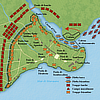

Heir of what remained of the Roman Empire, the Byzantine Empire, on the one hand managed to free itself from a linguistic, religious and even legal-dynastic from its "heavy predecessor", but was not able to propose, excluding short periods, a policy of territorial expansion, in total contrast with the conservative attitude, from a purely military point of view, which had characterized the last decades of the western empire. It must reported notables exceptions to this definition: Belisario (Justinian) and Heraclius above all, showed that the Byzantine military capabilities were far to be underestimated, indeed, with the centuries passing away, the military operations carried out by byzantine, will become more rare, as well as the successes of the Romans of the East. The ambitious project of "resauratio imperii" if had remarkable results, thanks to the mighty Belisarius and Narses, who brought under the control of the emperor (not yet Basileus) Justinian, the territories of North Africa, Italy, and part of the Iberian Peninsula, could not boast the same success in terms of duration. The institutions of the Eastern Roman Empire in fact were never able to penetrate the re-conquered lands as happened with their predecessors of the West. In fact, the "Romanization" had not taken place, had already been exceeded and integrated into the, not always idyllic, merge between Roman and barbarian. In addition, "distracted" by commercial interests, by the strict tax system and also from the religious issues that alienated much of the potential Western allies, the Byzantine emperors, over the centuries, showed a sort of blocked action, from the tactical point of view, that will prove fatal to the imperial fortunes. The world around them was not only changing rapidly, but gave them difficult challenges right next to their boundaries. The first Arab expansion, schism and iconoclasm, the advent turkish and even the Crusades will mark, over the centuries, the end of rulers of Constantinople that did not know how to put appropriate remedies, and the fall of the capital itself by the Turks, in almost total Western European indifference, will be the most obvious epilogue for almost a thousand years "agony" of the Byzantine Empire.
Battles

December 12, 627
The battle of Niniveh was the culminating battle of the conflict Byzantine-sasanide developed him between 602 and the 628. Byzantine victory brought to the civil war in Persia and, for a certain period of time, it restored the empire bringing it on its ancient confinements in the Middle East. This rebirth of power and prestige it didn't last for a long time; in the turn of few decades the Arabic caliphs once more they brought the empire on the edge of the destruction.

6 April - 24 May 1453
The siege of Constantinople represent another example of the ancient confrontation between East and West, which in this case marks the moment of maximum splendour of the Turkish power.
| Home | Battles Index | Cartography | Chronology | Forum |